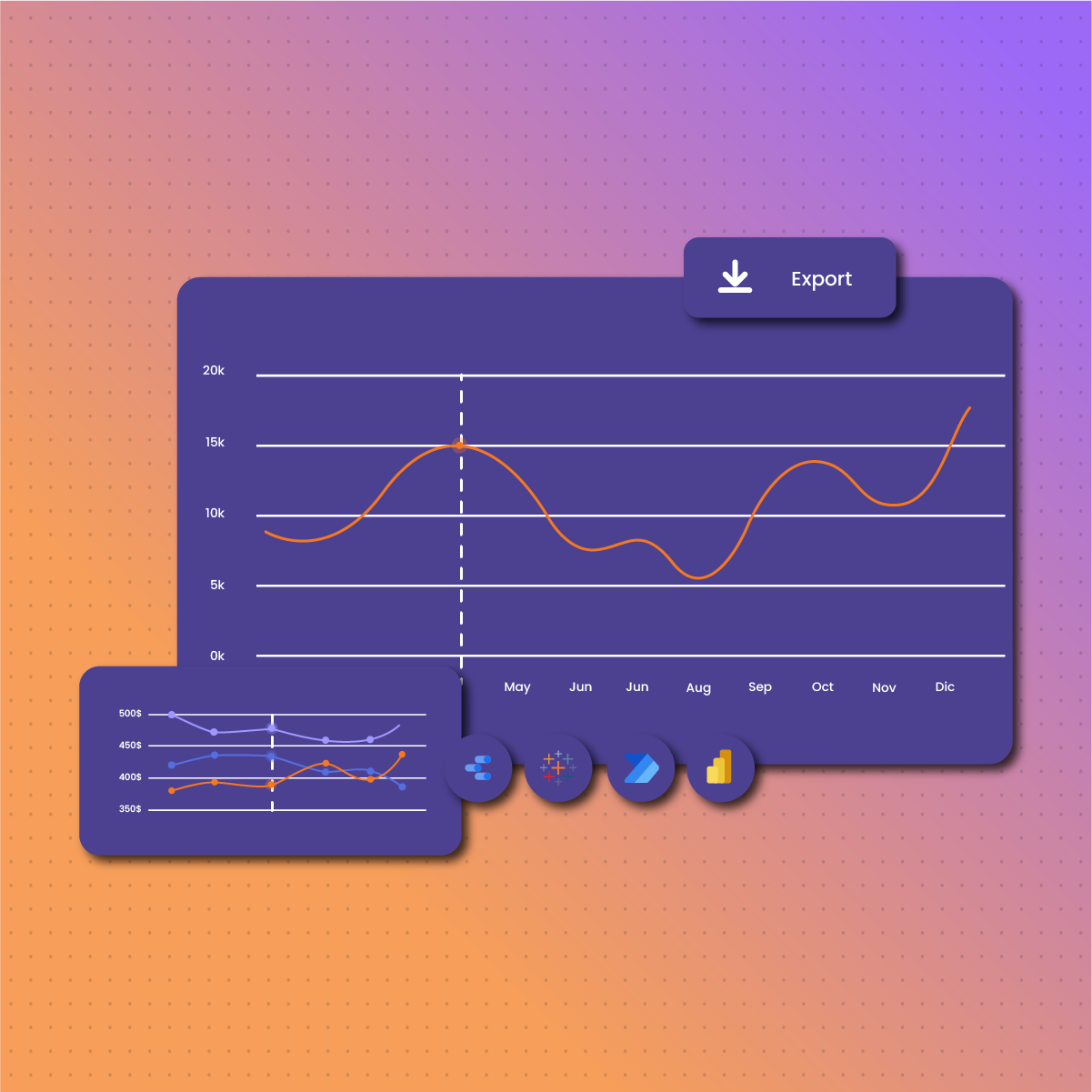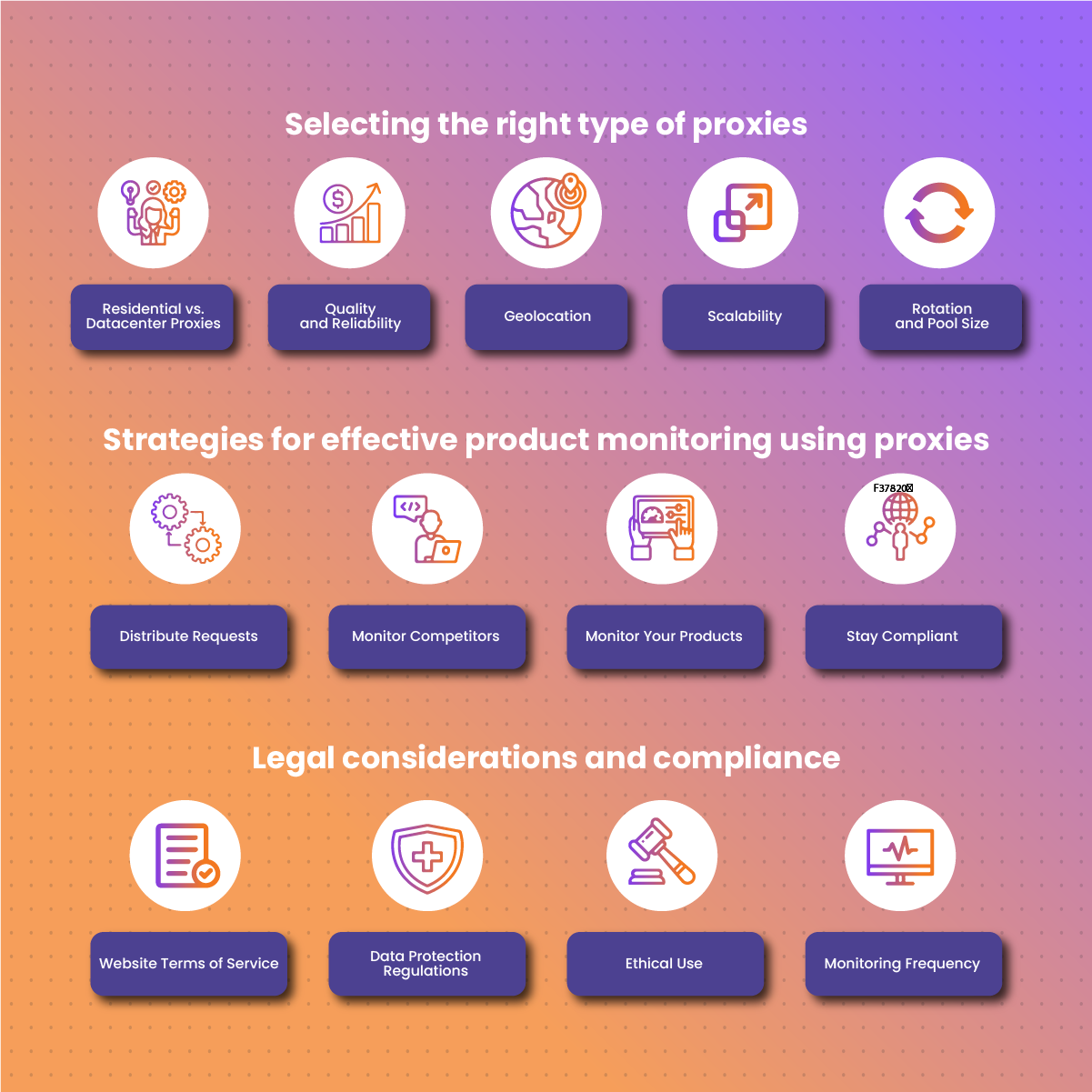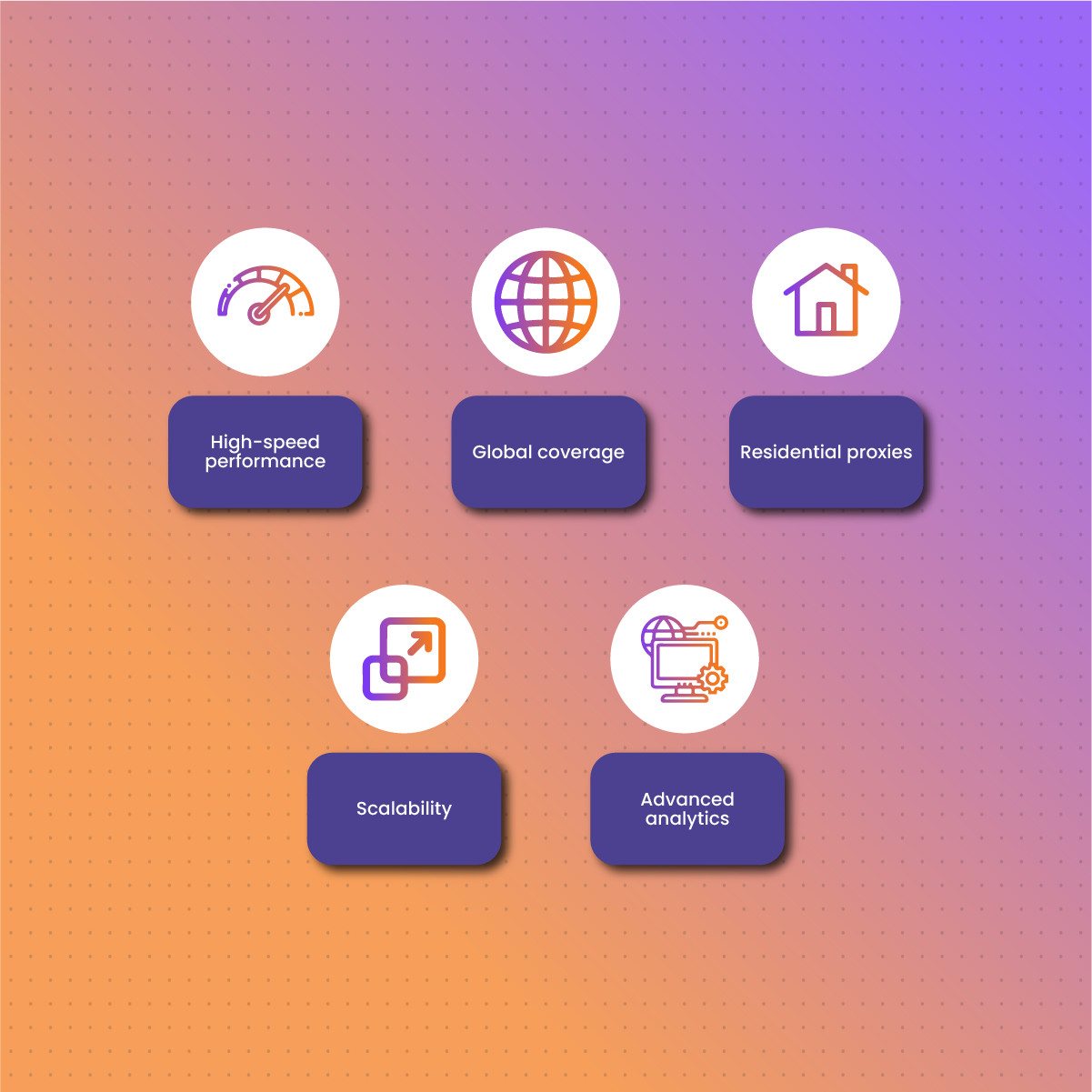Introduction
It is no longer news that the ecommerce space is constantly evolving. Therefore, keeping an eye on your products as much as having them listed on your website is crucial. Imagine this: you’ve got an online store, and you’re selling trendy sneakers. Now, you must know if those sneakers fly off the virtual shelves or gather dust in your inventory. That’s where product monitoring comes in.
Why is this important? Because in ecommerce, information is power. Knowing when to restock, adjust prices, or tweak your marketing strategy can mean the difference between booming sales and being left behind in the dust of your competitors’ virtual shopping carts.
In this guide, we’ll look into what product monitoring is, why it’s important for ecommerce businesses, and how proxies can influence your monitoring efforts.
Understanding Product Monitoring in Ecommerce
Product monitoring in ecommerce is like having a digital watchdog for your online store. It involves closely monitoring your products, tracking their performance, and gathering valuable data to make informed decisions. Whether it’s keeping an eye on inventory levels, pricing trends, or analyzing customer reviews, product monitoring ensures that you stay ahead of the game in the fast-paced world of online retail.
Importance of Monitoring Product Data, Pricing, and Availability
Data Accuracy
Product monitoring ensures that the information displayed on your website is accurate and up-to-date. This includes product descriptions, images, and specifications. Therefore, maintaining accurate product data builds customer trust and reduces the risk of returns or complaints.
Pricing Strategy
Keeping an eye on pricing trends helps you stay competitive in the market. By monitoring competitors’ prices and adjusting your own accordingly, you can attract more customers and maximize your profits.
Inventory Management
Product monitoring allows you to track inventory levels in real time. This helps prevent stock outs or overstock situations, ensuring you always have the right products to meet customer demand.
Customer Satisfaction
Monitoring product availability and managing inventory effectively contribute to a better customer shopping experience. Nobody likes seeing their favorite item out of stock, so keeping products available when wanted is key to customer satisfaction.
Challenges in Product Monitoring
Despite its importance, monitoring ecommerce products comes with its fair share of challenges. Understanding and addressing these challenges is crucial for businesses to manage their online operations and stay competitive. Below are some common challenges involved:
Data Overload
With thousands of products and endless data streams, product monitoring can quickly become overwhelming. Sorting through all this information to extract meaningful insights can be daunting.
Dynamic Pricing
Prices in the ecommerce world are constantly changing due to factors like demand, competition, and seasonality. Keeping track of these fluctuations and adjusting your pricing strategy requires constant vigilance.
Competitor Activity
Monitoring competitors’ products and pricing strategies is essential for staying competitive. However, keeping up with their ever-changing tactics and innovations can also be challenging.
Technical Limitations
Some ecommerce platforms may impose restrictions or limitations on ecommerce data scraping, making it difficult to gather the information you need for effective product monitoring.
Regardless of all these, monitoring products remains an indispensable act for ecommerce businesses looking to stay competitive in today’s marketplace. By overcoming these obstacles and leveraging the right tools and strategies, businesses can unlock valuable insights and drive success in online retail.
The Role of Proxies in Product Monitoring
Proxies, in the simplest terms, are like digital intermediaries. When you browse the web, your device sends requests to access websites directly. However, when you use a proxy, your requests are routed through a separate server before reaching the destination website. This server acts as a buffer between you and the internet, masking your device’s IP address and providing you with a different one.
Now, why is this important? Well, think of your IP address as your online identity. Websites can track your IP address to determine your location, device type, and browsing history. By using a proxy, you hide your identity, making it more difficult for websites to trace your activity back to you. It’s like wearing a disguise while surfing the web – nobody knows who you are.
Benefits of using proxies for monitoring ecommerce products
Anonymity and Avoiding IP Bans
One of the primary benefits of using proxies for product monitoring is anonymity. Ecommerce websites often have measures in place to prevent automated scraping of their data. When you use proxies, each request appears to come from a different IP address, making it harder for websites to detect and block your activity. This helps you bypass proxy blocks and continue monitoring product data without interruption.
Scalability for Handling Large-Scale Monitoring Tasks
Product monitoring can involve scraping data from hundreds or thousands of websites and platforms. Proxies enable you to distribute your monitoring tasks across multiple IP addresses, allowing you to scale your operations without overloading any single server. This ensures smooth and efficient data collection, even when dealing with large volumes of information.
Geotargeting Capabilities for Accessing Region-Specific Data
Ecommerce businesses must often monitor product availability, pricing, and trends in specific regions or countries. Proxies with geolocation capabilities allow you to access region-specific data by routing your requests through servers in those regions. This enables you to gather insights tailored to the local market conditions and better understand customer preferences and behavior on a global scale.
In summary, by leveraging proxies effectively, ecommerce businesses can overcome technical limitations, avoid detection, and gather valuable insights to drive success in the competitive online marketplace.
Best Practices for Product Monitoring with Proxies
When it comes to monitoring your ecommerce products with proxies, there are certain practices to consider. These practices include:
Selecting the right type of proxies
Selecting the right type of proxies is crucial for ensuring the success and effectiveness of your efforts. Here are some key factors to consider when choosing the type of proxies:
- Residential vs. Datacenter Proxies: Understand the differences between residential and datacenter proxies. Residential proxies offer genuine IP addresses from internet service providers, while datacenter proxies are faster but may be more easily detected by websites.
- Quality and Reliability: Choose proxies from reputable providers known for their reliability and uptime. Ensure that the proxies you select have low latency and high-speed connections to avoid delays in data retrieval.
- Geolocation: Consider proxies with geolocation capabilities if you require access to region-specific data. Geotargeting can be crucial for businesses operating in multiple regions or countries.
- Scalability: Opt for proxies that offer scalability, allowing you to handle large-scale monitoring tasks without compromising performance or reliability.
- Rotation and Pool Size: Look for proxies that offer IP rotation and a large pool of IP addresses. Rotation helps prevent detection and bans, while a large IP pool ensures availability and diversity.
Strategies for effective product monitoring using proxies
Implementing effective strategies for monitoring ecommerce products using proxies can greatly enhance your ability to gather valuable data, track competitor activities, and optimize your ecommerce operations. Here are some strategies to consider:
- Distribute Requests: Distribute monitoring requests across multiple proxies to avoid detection and improve efficiency. Rotating IPs and using different proxy servers can help distribute the workload and reduce the risk of IP bans.
- Monitor Competitors: Using proxies to track competitor prices, product availability, and promotional activities. Compare your offerings to those of competitors and adjust your strategies accordingly to stay competitive.
- Monitor Your Products: Use proxies to monitor your products’ performance, pricing, and availability across different platforms. Identify areas for improvement and make data-driven decisions to optimize your product listings.
- Stay Compliant: Ensure compliance with website terms of service and legal regulations when scraping data using proxies. Avoid aggressive scraping techniques that may violate website policies or infringe on intellectual property rights.
Legal considerations and compliance
One of the best practices to consider is their legal terms and compliance. Here are some key legal considerations and compliance guidelines to keep in mind:
- Website Terms of Service: Review and comply with the terms of service of the websites you are monitoring. Some websites may prohibit data scraping or impose limitations on proxies.
- Data Protection Regulations: Ensure compliance with data protection regulations such as GDPR or CCPA when handling personal data obtained through product monitoring. Protect customer privacy and data security at all times.
- Ethical Use: Use proxies and monitoring techniques ethically and responsibly. Avoid disrupting website operations or causing harm to competitors through malicious activities.
- Monitoring Frequency: Be mindful of the frequency and volume of monitoring requests to avoid overloading websites’ servers. Respect website policies and avoid engaging in activities that may result in service disruptions or penalties.
In summary, by following these best practices, businesses can effectively leverage proxies for monitoring ecommerce products.
Tools and Resources for Proxy Management and Monitoring
Managing and monitoring proxies effectively is essential for optimizing product monitoring efforts and ensuring compliance with legal regulations. Here are some tools and resources to help you manage and monitor proxies efficiently:
Proxy servers
There are numerous proxy providers in the market. However, a reliable provider in the market is NetNut. They offer rotating residential, datacenter, and mobile proxies tailored to your different use cases and requirements.
Proxy management platforms
Furthermore, you can use proxy management platforms to streamline proxy deployment, monitoring, and optimization. These platforms offer IP rotation, geotargeting, and performance monitoring features.
Proxy testing tools
More so, proxy testing tools should be considered to evaluate the performance and reliability of proxy connections. These tools help identify connection errors, latency, and IP bans.
Proxy integration libraries
In addition, you can leverage proxy integration libraries and frameworks to integrate proxies into your monitoring systems and applications seamlessly. These libraries offer APIs and SDKs for proxy management and configuration.
Community forums and documentation
For further activities, you can explore online forums, documentation, and tutorials for guidance on proxy management best practices, troubleshooting tips, and usage examples. Engage with the proxy community to share insights and learn from others’ experiences.
By following these steps and leveraging the right tools and resources, businesses can effectively implement proxies in their monitoring systems, enhance data retrieval capabilities, and drive success in the competitive ecommerce landscape.
Effective Product Monitoring using NetNut Proxies
NetNut is a leading proxy service provider that offers advanced solutions for businesses seeking to enhance their product monitoring capabilities in the ecommerce space. With a focus on reliability, performance, and flexibility, NetNut has emerged as a trusted partner for businesses looking to leverage proxies for data gathering and analysis.
Why use NetNut for ecommerce monitoring?
NetNut offers a range of features and capabilities tailored specifically for ecommerce product monitoring. Here are some key features that make NetNut stand out:
- High-speed performance: NetNut boasts a high-performance proxy network optimized for speed and reliability. With lightning-fast connection speeds and minimal latency, businesses can gather data quickly and efficiently, ensuring timely insights for decision-making.
- Global coverage: NetNut also offers a vast proxy network with global coverage, providing businesses with access to data from around the world. Whether you’re monitoring local markets or expanding internationally, NetNut’s global proxy network ensures access to the data you need wherever your business operates.
- Residential proxies: NetNut’s rotating residential proxies offer genuine IP addresses sourced from real users, providing businesses with the highest anonymity and reliability. With residential proxies, businesses can gather data without the risk of detection or IP bans, ensuring uninterrupted product monitoring activities.
- Scalability: NetNut’s proxy infrastructure is built for scalability, allowing businesses to handle large-scale monitoring tasks easily. Whether you’re monitoring hundreds or thousands of products, NetNut’s scalable proxy solutions can accommodate your needs, ensuring that you have the resources you need to keep up with demand.
- Advanced analytics: NetNut offers advanced analytics tools and reporting features, allowing businesses to gain valuable insights from the data gathered through product monitoring. With customizable dashboards and real-time analytics, businesses can track key metrics, identify trends, and make data-driven decisions to drive ecommerce success.
Finally, NetNut provides ecommerce businesses with a powerful platform for enhancing ecommerce monitoring capabilities.
Conclusion
Without any doubt, it is obvious that product monitoring plays a crucial role in ensuring that your online store remains competitive. For this cause, proxies are the secret weapon that can take your monitoring efforts to the next level.
Businesses can enjoy various benefits by using proxies to monitor e-commerce sites. Proxies provide anonymity, allowing businesses to scrape data without detection and avoid IP bans. They also offer scalability, enabling businesses to handle large-scale monitoring tasks efficiently. Additionally, proxies with geotargeting capabilities allow businesses to access region-specific data, helping them tailor their strategies to different markets.
So, if you’re looking to boost your ecommerce success, consider leveraging the power of proxies for product monitoring. With proxies, you’ll have the tools to stay ahead of the curve and excel in the online marketplace.
Frequently Asked Questions and Answers
Do proxies require technical expertise to set up and manage?
While some technical knowledge may help set up proxies, many proxy providers offer user-friendly interfaces and support to simplify the setup and management process.
Can proxies help businesses monitor competitor prices and strategies?
Yes, proxies enable businesses to monitor competitor prices, product availability, and promotional activities, providing valuable insights for staying competitive.
How often should businesses conduct product monitoring using proxies?
The frequency of monitoring depends on factors such as industry dynamics, competitor activity, and marketing objectives. Regular monitoring is recommended to stay informed about changes in the market landscape.









